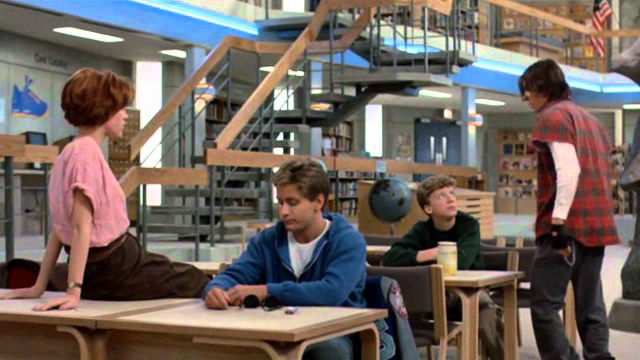Movie Review: The Breakfast Club (1985)
“They only met once, but it changed their lives forever.”


The Breakfast Club (1985)
Director: John Hughes
Cast: Emilio Estevez, Judd Nelson, Molly Ringwald
Synopsis: Five high school students are forced to spend a day together as they serve detention for various offences.
Like us on Facebook
Catch all our reviews on Facebook.
WARNING! This review contains SPOILERS!
In a movie, it’s normally a disaster of some kind that forces a disparate group of strangers to interact with one another. But in John Hughes’ The Breakfast Club, it’s teenage misbehaviour that brings together its protagonists to share the same time and space for 8 hours under the withering – but infrequent – gaze of Richard Vernon (Paul Gleason – She’s Having a Baby, Die Hard), the kind of teacher who spends his working life in a perpetual state of high dudgeon.
There are five of them – three boys and two girls – each of whom represents one of the five ranks into which most of us could be placed when we were schoolkids. Claire Standish (Molly Ringwald – Sixteen Candles) is the kind of popular prom queen whose father apologetically promises to make amends for failing to get her out of having to spend her Saturday in detention. The father of clean-cut Andrew (Emilio Estevez – Young Guns), a member of the school wrestling team, is more dismayed that his son was caught misbehaving than about the actual act which has resulted in his detention. The misdemeanour of Brian (Anthony Michael Hall – Weird Science, Six Degrees of Separation), the underweight brainy kid, is a cry for help that would trigger all kinds of psychological probing today, but The Breakfast Club is set in 1984, and might as well be on another planet when it comes to such things. Allison (Ally Sheedy) is the quiet Goth, the girl who doesn’t fit in and has no friends, but is a little too psychologically askew to care. Finally, there is the bad boy, Bender (Judd Nelson), whose abrasive nature ultimately knits together a group of kids who, had he not been in attendance, would probably have passed the day in polite silence.
Perhaps you have to be a teenager to really connect with the characters in The Breakfast Club – and perhaps the dating of once prevalent teenage norms means that the movie is growing old fast. Whatever the reason, it’s difficult to warm to any of the characters in the movie, and it doesn’t take long for Bender’s constant baiting to try one’s patience. He’s an angry kid whose father beats him, and the way in which he goads Vernon into issuing a string of additional day-long detentions suggests he would rather spend his Saturdays at school than at the mercy of his old man. The primary target of his anger is Claire, the prom queen, whose life of privilege couldn’t be further from his own, and while this doesn’t necessarily make the film’s concluding scenes unlikely, Bender’s deeply ingrained bitterness does suggest that, for him, their union is nothing more than a momentary (and doomed) diversion from a future in which incarceration seems inevitable. At least his day follows a more credible path than that of Allison, who undergoes an ugly duckling transformation which is truly damaging to the film, and completely invalidates her as a character.
The Breakfast Club is famous not only for being one of Hughes’ seminal works, but for the casting of several members of the Brat Pack, the band of young actors whose brief reign over Hollywood proved to be a triumph of looks over talent. The subsequent careers of its members serves as proof of just how ordinary most of them were. Ringwald and Sheedy give creditable performances, and Anthony Michael Hall always put in a decent shift, but the shortcomings of Nelson and Estevez are cruelly exposed. Nelson tosses his hair, flares his nostrils and stares intently at anyone who irks him, but succeeds only in illustrating his limitations as an actor rather than the inner turmoil of his character, while Estevez gives such a bland performance that it’s a wonder he doesn’t simply blend in with the set.
While The Breakfast Club isn’t without some merit – much of Hughes’ dialogue succinctly captures the self-conscious introspection and directionless anger of youth – its enduring exalted status is something of a mystery.
(Reviewed 26th October 2016)
httpv://www.youtube.com/watch?v=BSXBvor47Zs

0 Comments